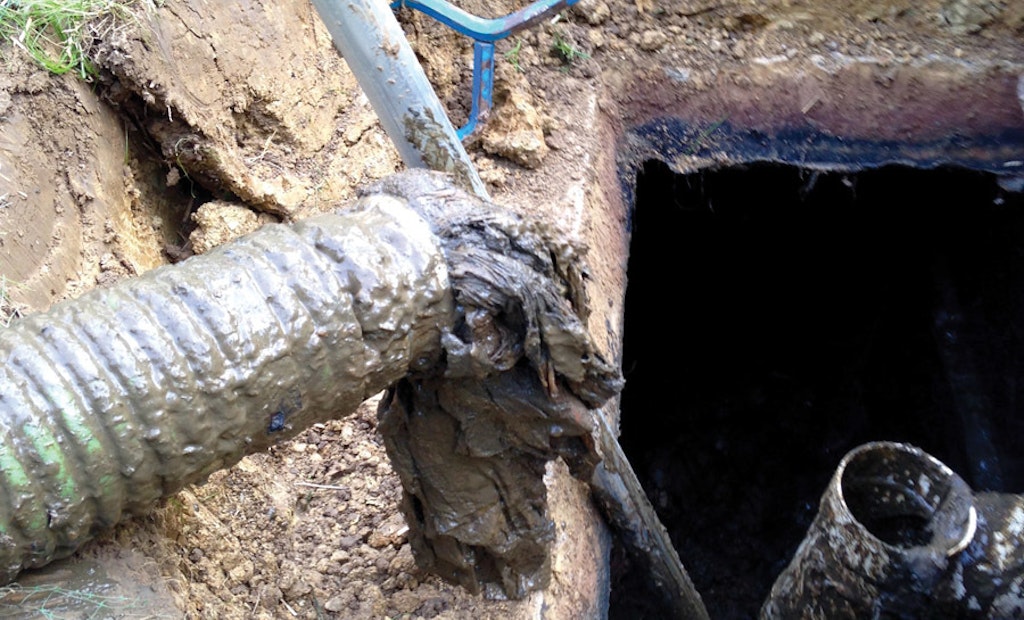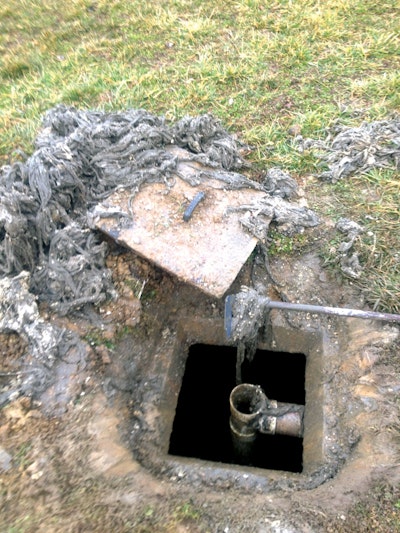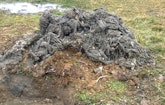
Every time a suction hose clogs with wipes, the pumper has to stop and remove the blockage. (Photo by Danny Duncan)
Interested in Onsite Systems?
Get Onsite Systems articles, news and videos right in your inbox! Sign up now.
Onsite Systems + Get AlertsGetting action to require the makers of popular “flushable” wipes to market the products accurately is proving to be more difficult than handling the fatbergs of the woven wipe material as it comes out of the septic tank.
Pumpers have been grappling with this messy situation for far too long, as have municipal treatment plants whose waste streams are being overwhelmed by the convenience products popular with household consumers. While the companies that manufacture wipes are raking in millions of dollars, pumping companies are wasting manpower raking the stubborn wipes off bar screens, out of vacuum truck tanks and away from their suction hoses.
The wastewater industry has been fighting this battle for years. Customers tell pumpers the wipes packaging says the products are “flushable,” so they don’t understand how they could be the cause of clogs in tanks and even system failure when the problems make it through the septic and pump tanks and work their way into the drainfield. Pumpers explain the wipes packaging is misleading and that just because a wipe will flush down the toilet doesn’t mean it will harmlessly break down in the septic tank the way toilet paper does.
No matter how septic service providers try to educate the public, they still routinely encounter clumping masses of wipes that lead to backups, more frequent pumping calls and misplaced rage from customers. I’m sure you all have stories of how wipes can ruin your day — not just with customer complaints — but with slowing down the progress of your crews and impacting your bottom line.
IT’S HAPPENED TO YOU
Take Danny Duncan, for example, owner of Duncan and Daughters Septic Service in Bardstown, Kentucky. I like to catch up with Danny every so often to see how he’s doing and how business is going in the Bluegrass State. During a recent phone catch-up, Danny shared wipes story from the previous week that is probably — and unfortunately — too familiar to the rest of the Pumper community.
He’d rolled up on a service call, popped open the septic tank and started digging around with his Crust Buster. Finding layer upon layer of wipes, he knew he was going to be there a long time clearing his blocked suction hose and capturing and segregating a pile of wipes outside the tank for proper disposal. Surveying the mess, he shut down the pump and called the customer who wasn’t home at the time, explaining that he would have to charge $50 extra to bag and dispose of the wipes.
He thought $50 was a bargain considering how much work lay ahead of him. The customer thought differently, asking Danny to leave the wipes on the ground for her to handle later.
“I’ll bet when she got home and saw the pile, she regretted that decision,” he told me. It’s doubtful the customer understood that wipes actually don’t break down and underestimated her family’s use of the product. Danny was kind enough to share a few photos that are typical of the problem pumpers continue to face with so-called “flushable” wipes.
LEGAL WRANGLING
I’m sure it’s obvious to all of you that the wipes problem isn’t going away. So what’s the status of efforts to hold the makers of these products responsible for a massive misinformation campaign? Well, there has been some progress on the legal front, but not much considering the damage wipes have caused over several years.
First, Bloomberg reported in 2021 that wipe maker Kimberly-Clark reached a settlement to come up with better labeling for its products and manufacturing changes that would see the Cottonelle brand of wipes meet wastewater industry “flushability” standards by this month. In a statement, Kimberly-Clark said the wipes “pass widely accepted flushability specifications and are tested with plumbers.”
The wipe maker’s settlement came after the company was sued by the Charleston, South Carolina, water management system. A water authority representative, Mike Saia, applauded the settlement but has said there is a lot more work to do.
“We feel Kimberly-Clark is less than 10% away from the flushability testing to be flushable,” Saia said in a story by the Alabama website, Al.com. However, he said none of the other manufacturers are close to making wipes septic safe.
“What we want is for them to do two things. Change the physical makeup of the wipe, so it’s in fact flushable, and improve their packaging to make the marketing say that they do not flush for the non-flushable wipes,” he concluded.
The Bloomberg story noted that lawsuits are ongoing against other companies, including Costco Wholesale, Procter & Gamble, CVS Health, Target, Walgreens Boots Alliance and Walmart.
SEWER AND SEPTIC
The law firm Morgan and Morgan, spearheading a class action lawsuit against wipes manufacturers, notes on its website that homeowners report issues with plumbing systems related to these products, including toilet clogs, increased utility rates, septic backups and septic system failure.
It says that wastewater treatment plants in the Washington, D.C., area report that wipes caused a 35% increase in broken pumps and clogged sewer lines. A suburban Washington sanitary commission reported spending $1 million installing a special grinding system to shred wipes and other debris before they reach the pumps.
Morgan and Morgan noted a study in which municipal sewer workers dyed Kirkland brand wipes in bright colors and monitored them as they traveled one mile through the sewer system. When retrieved, the “flushable” wipes were still intact and showed only minor rips and tears.
All this evidence only confirms what pumpers have been seeing in the field, that wipes said to be “flushable” are still being used at an astonishing rate. On one hand, the manufacturers are continuing with misleading product labeling. On the other, consumers want to believe wipes are flushable because they are remarkably convenient to use.
COPING WITH WIPES
And so it appears this wipes problem won’t be solved on a broad scale anytime soon. You’re going to continue to run into revenue-killing clogs on your service routes. What can pumpers do to educate customers and ensure sustainable profits for their companies? I have a few ideas:
Make wipes a cornerstone of your consumer education program
Don’t miss any opportunity to explain this problem to your customers. Include information about the controversy on your website. Post blogs reviewing media stories about wipes lawsuits. Add wipes to a checklist of topics to discuss face-to-face with customers when making service calls. Tell customers to throw wipes out with the trash rather than send them to the septic tank.
Red-flag systems where you have found a wipes problem
Make note of wipes usage on your service record form. Warn homeowners of the threat these products cause for their entire septic systems. The next time you are called to these flagged households, review any potential charges the customer could face for more time on the job or wear and tear on your equipment if wipes are encountered. Keep careful maintenance notes in the event these systems deteriorate because of wipes usage.
Create a plan to continue to charge for profitability on every job
Pumpers who have a fixed pumping fee risk losing money when they encounter a tank heavily filled with wipes. Excessive wipes take additional time on the job and could lead to issues with your disposal partners. It’s not acceptable for pumpers to bear the brunt of these additional costs. Find a good mechanism to charge for the added workload, whether that is a fixed upcharge, an added disposal fee based on weight or volume of wipes or by charging an hourly rate for time and materials.
SHARE YOUR IDEAS
Wipes are a growing source of frustration for pumpers. … Danny Duncan is one of many who can attest to that. Industry-wide, wipes are creating a slow leak of profitability from our small business owners who can’t afford the losses. Assuming an end isn’t in sight to this problem, let’s share our experiences and solutions for how to limit the impact of wipes on the pumping community. If you have additional ideas on how to cope with “flushable” wipes, drop me a line at editor@pumper.com and I will pass along your thoughts in a future column.







